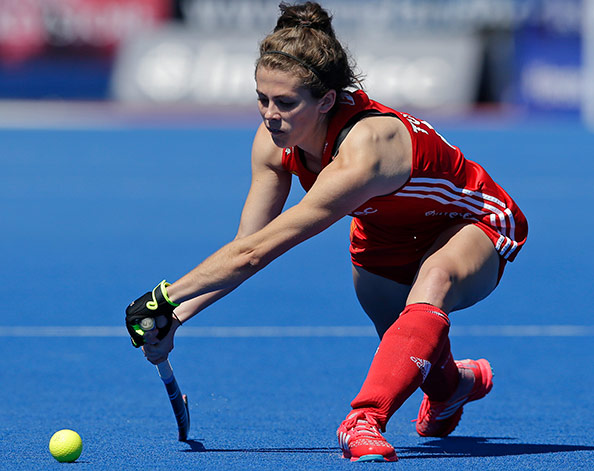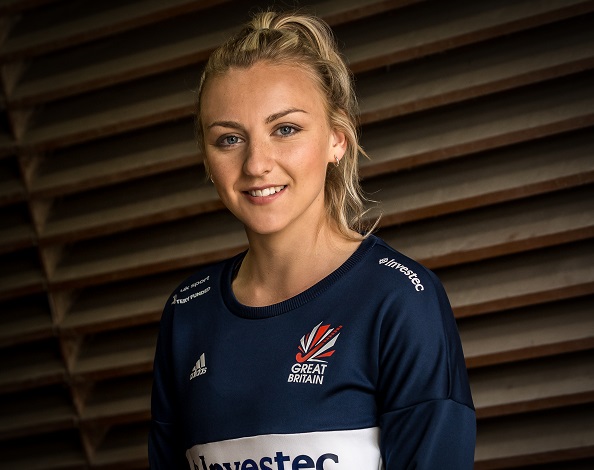
15 Apr 2019
Learning from the past to prepare for the future
Sport isn't just about physical attributes; players need the intelligence and mindset to learn important lessons from both their successes and failures. What memorable lessons have key GB squad players taken from their illustrious international careers?
Athletes are often focused on the future: the next big game, the next tournament win, the next trophy or medal. But the best teams, the ones that always seem to have an edge over the competition, recognise you can't only look forward if you want to evolve.
In hockey, players need more than pure physicality to keep winning, they require the sporting intelligence, positive mindset and attention to detail to tackle every eventuality out on the field. Learning from your own and others' past experiences, whether they are successes or failures, is key to preparing for the challenges of tomorrow.
Lessons learned from past mistakes
GB Hockey veterans Hannah Martin, Giselle Ansley, Anna Toman and Hollie Pearne-Webb all emphasise the importance of examining past performances to learn valuable lessons on how to improve.
What pearls of wisdom would they like to pass on to the next generation of players?
"I've learnt to always push yourself in everything you do. That's been a massive part of my career so far; pushing outside your comfort zone and feeling comfortable being uncomfortable," Hannah, a midfielder and forward, advises. "Just make sure progress is happening step by step."
Defender Giselle has been playing international level hockey for six years and believes the biggest lesson she has learned is that it's okay to make mistakes, provided you learn from them afterwards.
"You try not to make the same mistake again, but you must also portray outwardly that it hasn't broken you. You can keep going," the 27-year-old explains.
Developing the mental resilience to rebound from lapses in judgement is key for Anna. Whether it's on the training ground with just your teammates, or in front of thousands of spectators on the world stage, quickly regaining your composure is crucial.
She says: "You have to bounce back. If you don't, you're just going to keep making mistake after mistake, and you're going to regret it."
The importance of training your brain
All the players agree the psychological side of the game is where an air of unpredictability can creep into any team. At the international level, athletes train relentlessly to maintain peak physical condition, but mental strength is much harder to teach.
According to Hollie, the best players are successful because they can make the right decisions more consistently under pressure than their peers. Even the most naturally gifted athletes won't make it in hockey if they lack this quality.
"How you best deal with that is in training and making sure we can replicate the decision-making we would face in a game. We're lucky that we have a squad that allows us to do that because we need to train at that match intensity in order to make those decisions on a regular basis," Hollie says.
The GB team couldn't ask for a better place to train; they spend their days at the Bisham Abbey National Sports Centre in Berkshire. Here, they have access to cutting-edge facilities, including a comprehensive video analysis suite, a state-of-the-art gym, a full-size hockey pitch and a sophisticated physiotherapy medical unit.
Despite this, players still often have a mountain to climb, psychologically speaking.
"Mental pressure is quite hard to replicate. Physically, we all know what we can do. We do it day in, day out. But to replicate real pressured moments mentally is quite hard because we don't have thousands of people watching us train," Anna explains.
Preparing for the big matches
Players must be prepared for a range of different situations and unexpected scenarios. How quickly they adapt to these changes can make or break the entire team's performance.
"The mental side of hockey is absolutely massive. If we didn't work at it, we wouldn't be talking about the lessons that we've learned or playing on an international hockey pitch," Giselle says.
So, how do the GB squad 'work at it'? Everyone has their own unique approach to mental preparation for upcoming games.
Hannah likes to jot down two or three things that are completely within her control, helping her maintain focus regardless of what else is happening on the pitch. Hollie also has a notepad, but hers is filled with important tactical points and key match information.
Keeping a clear head and relaxing is what works for Anna; she's been known to catch a nap on the team bus ahead of match day, but that's only because she has total confidence in her preparation and teammates. Meanwhile, Giselle is a self-confessed hockey geek who wiles away the hours watching opposing teams' previous matches to identify their strengths and weaknesses.
"Some people really psyche themselves up. A few have their own dance moves in the changing room. One girl has her special playlist that she listens to, while others just sit there looking totally away with the fairies," Giselle adds.
"The beauty of a team sport is that everyone has their own different way of dealing with things and preparing for a big match."

Read: Anna Toman shares the five moments that shaped her hockey careerMental pressure is quite hard to replicate. Physically, we all know what we can do. We do it day in, day out. But to replicate real pressured moments mentally is quite hard because we don't have thousands of people watching us train.
Connecting as a team
Each player may have their own pre-game routine, but they stop being individuals when they step out onto the field. The whole squad does the same warm-up and makes sure to get conversation flowing with one another to connect better as a team once the whistle blows.
"The good thing about our team is that we all know each other's rituals now, and we really respect them. But then we'll have a moment where we're all together, whether it's in the tunnel and we'll all high five. We'll all have body contact, eye contact. That moment is really important for us," Anna says.
This strong team spirit was a key factor in helping the GB squad win gold at the Rio 2016 Olympics. Giselle and Hollie were both part of that squad and are keen to foster a similar culture within the team that led to victory at the Games. Again, the mental aspect, rather than physical attributes, is what Hollie believes separates the GB team from competitors.
"We didn't necessarily have the best 16 individually talented hockey players on the pitch that final day. But we definitely had the best squad; the mentally toughest, the most resilient and the best prepared squad. That is why I think we were successful."
Whether the team will repeat its gold medal-winning performance at Tokyo 2020 is yet to be seen. What we do know is that the squad is going into the tournament with the right mindset, the best preparation and the sporting intelligence to learn from past successes and failures.
Investec is the principal partner of the England and Great Britain women's hockey teams, and the title sponsor of the Investec Women's Hockey League and women's knockout competitions.
Browse articles in

